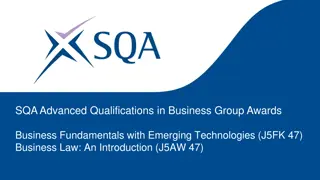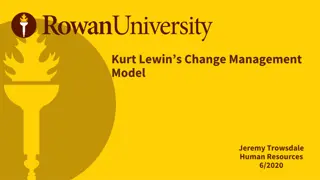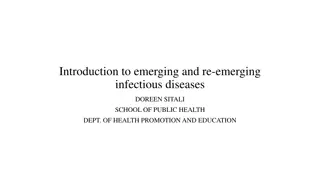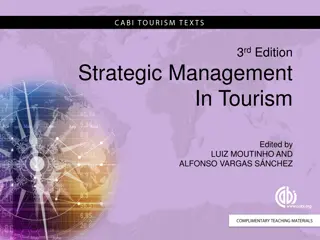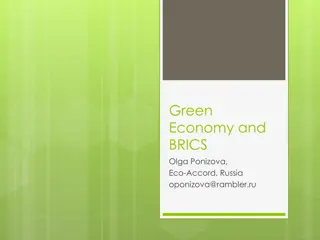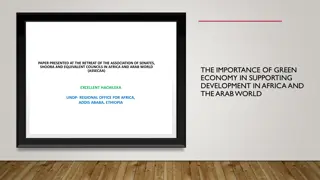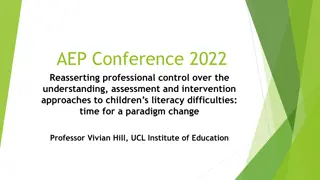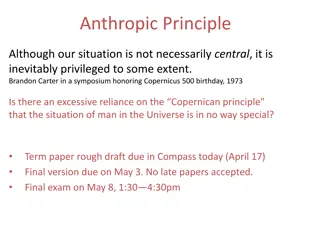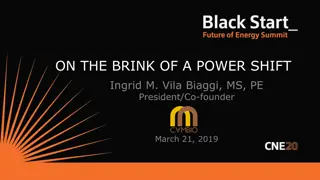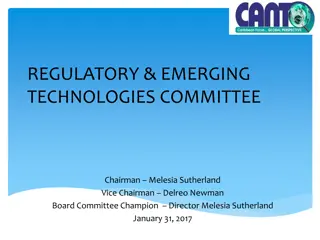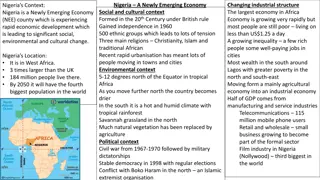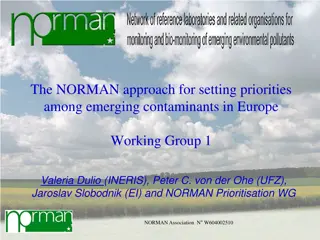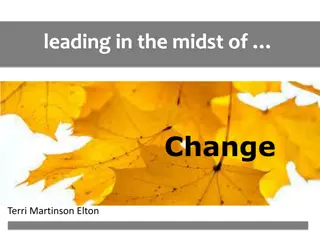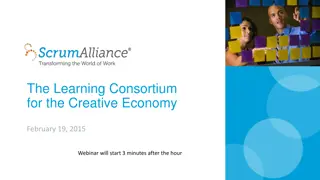Emerging Change in the New Economy Paradigm
"Explore the evolving landscape of the economy paradigm with insights from professionals in the field. Delve into the shifts, challenges, and opportunities presented by the dynamic global economy."
Uploaded on Mar 13, 2025 | 4 Views
Download Presentation

Please find below an Image/Link to download the presentation.
The content on the website is provided AS IS for your information and personal use only. It may not be sold, licensed, or shared on other websites without obtaining consent from the author.If you encounter any issues during the download, it is possible that the publisher has removed the file from their server.
You are allowed to download the files provided on this website for personal or commercial use, subject to the condition that they are used lawfully. All files are the property of their respective owners.
The content on the website is provided AS IS for your information and personal use only. It may not be sold, licensed, or shared on other websites without obtaining consent from the author.
E N D
Presentation Transcript
Emerging Change-The New Economy Paradigm K V CH Madhu sudhana rao, cerner healthcare pvt. Ltd., bangalore, india. Email: madhukondaveti@gmail.com Mythili Kolluru, Assistant Professor, Professional Studies and Undergraduate Dept., College of Banking and Financial Studies; Muscat, Oman, E-mail: mythili@cbfs.edu.om Denis Hyams-Ssekasi, Institute of Management, University of Bolton, Deane Road, Bolton, BL3 5AB U.K. Email: dh4@bolton.uk
Summary This paper examines and ascertains the dominant and latent characteristics of the new economy post COVID-19 The study administered online questionnaires to professionals globally and conducted online semi-structured interviews of economists, entrepreneurs, and organizational leaders across ten countries The research findings have indicated the emerging changes in the economy and way of life leading to a new normal The study noted the variations in the new economic trends, possibilities, challenges, and coping strategies to survive and thrive in the new economic paradigm. Therefore, these research findings provide valuable and insightful economic releases which will have profound implications in the post COVID-19 world
Introduction Pandemics are not passing clouds in the sky. When they occur, be it the Spanish flu of 1918, the Black Death of 1930, or COVID of 2019, they erode years of established growth and throw economies into a declining spiral that lasts for years The coupled effect of health and economic crisis will have long-lasting and far- reaching repercussions. The sustained global economic recovery will be challenging with the rise of the prolonged nature of the health crisis The world will witness disruptions in the labor market, energy market, shipping, infrastructure, coupled with bottlenecks in the global supply chains The post COVID-19 economy will bring new opportunities in relation to digitalization, increase of e-commerce, global supply chain changes, de- globalization, de-urbanization, work from home, income inequality, poverty, inflation, career shifts and risks This paper explores the characteristics of the post COVID-19 new economic paradigm
Literature review The rise and fall of the COVID-19 viral pandemic which started in China and spread globally has caused massive dislocation in all operations including health, social and economic conditions highlighting the emergence of changes across the world (Delios, Perchthold & Capri, 2021) Manyika (2020) argues that the advances and future trends as well as the realities and perspectives of COVID-19 have prompted a reconsideration of likely effects of changes on long-term choices and goals for the economy and society Harari (2020) stresses that we will live in a changed world, but the changes in social organization that will flow will be from individual choices. Thus, the society will face two dilemmas: state of totalitarian surveillance and global solidarity In the view of Kissinger (2020) COVID-19 will permanently transform the international order, majorly dependence of global trade, the free movement of people and create the resurgence of walled cities
The study aims to explore the characteristics of the new economy The research further investigates the association of individual designation and industry to perceptions of the new economy which is lacking in the scholarly debate The identified research gaps affirm the below hypothesis development: Hypothesis 1: New economy perceptions of public sector employees are similar with private and non-profit sector employees Hypothesis 2: New economy perceptions of top-level employees are like middle-level and junior-level employees Hypothesis 3: New economy perceptions of top-level employees of public and private sector employees are the same Objectives
Methodology A hybrid methodology is selected that consists of both primary and secondary data analysis A quantitative electronic survey was distributed to employees of various sectors through multiple social media platforms The survey consisted of 12 dichotomous questions, and 126 professionals responded The researchers conducted a primary semi-structured qualitative interview with 16 experts The data is analyzed both quantitatively and qualitatively. The hypothesis is tested using Chi-square test For demographic analysis, frequency tables, percentages, and charts are used The interview transcripts were subject to content and thematic analysis
Analysis-Table 1: Post COVID- 19 economic patterns Parameter Increased digitalization will be witnessed More organizations will embrace hybrid working model The in-demand skill sets will change Individuals will attention to health and personal care Globally, consumptions patterns will change There is a permanent change to trade and supply chains There will geopolitical alterations Agree Disagree presence of 99% 1% 96% 4% In the above table, most of the respondents (>51%) agree with all the parameters mentioned questionnaire 93% 7% pay more in the 88% 12% 86% 14% possibility of 83% 17% be potential 80% 20%
Analysis: Hypothesis Testing No. Hypothesis P-Value Decision 1 No difference in the perceptions of public sector employees with private and non- profit sector employees 0.674 is >0.05 Accept null hypothesis 2 No difference in the perceptions of top- level employees with mid & junior level employees. 0.158 is >0.05 Accept null hypothesis 3 No difference in the perceptions of top- level employees of public & private sector employees 0.048 is <=0.05 Reject null hypothesis
Thematic analysis themes 1) Digitalization And Technological Advancement 2) Work From Home (WFH) And Hybrid Work Strategies 3) New Normal-new Business 4) Sustainability, Climate Change & Low Carbon Impact 5) Unpredictable Geopolitical Developments 6) Negative Impact Macroeconomic Variables 7) Precedence of Technical And Soft Skills 8) Heightened State of Business Awareness 9) Increased Focus on Employee Wellbeing 10) Sluggish Deglobalization
Dominant and Latent characteristics Dominant Characteristics Latent Characteristics Digitalization Remote/Hybrid working Climate Change Geo-political developments De-Globalization Health and wellbeing In demand skills Macroeconomic trends Consumption patterns
Analysis- Table-In-demand skills set Individual skill requirement Digital literacy Data analysis Self-learning Emotional intelligence Critical thinking Problem solving Digital communication Resilience Adaptability Organizational skill requirement Digital capabilities Agility Strategic thinking Ecological thinking Empathetic leadership Growth mindset Resilience Quick adaptability Global vision
Conclusion The study adopted a mixed methodology, and both qualitative and quantitative analysis was used to explore 126 online survey responses, 16 semi-structured interviews, and comprehensive desk research The researchers assessed twelve new economic characteristics; the respondents agreement varied from 52% to 99% The researchers supported the three hypotheses through chi-square analysis The interview scripts were analyzed using content and thematic analysis The content analysis highlighted the features of digitalization, economic change, remote working, skills upgrading, and sustainability The thematic analysis ushered 11 themes that describe the paradigm shift A quantitative and qualitative synthesis led to post COVID-19 dominant and latent characteristics of the new economic paradigm
Limitations & Future Scope Three noted limitations affected this study The first issue was that though our respondents and interview participants were entrepreneurs, economists, professors, and employees, we failed to include government officials. All the officials approached refused to give the public their opinion due to confidentiality issues A Second limitation was that the new economic paradigm is a novel research area; hence there could still be gaps in the knowledge base that need to be addressed The third limitation is the sample size might influence the conclusions In the future, Scholars could reinforce the results by including other sections of society like government officials and heads of state The dominance of the characteristics could vary across world regions. Additionally, research on comparative studies could shed light on similarities and dissimilarities in the new economy paradigm across countries
References Delios, A., Perchthold, G., & Capri, A. (2021). Cohesion, COVID-19 and contemporary challenges to globalization. Journal of World Business, 56(3), 101197. Harari, Y.N. (2020). The world after coronav rus. The Financial Times, March 21, 2020. https://www.ft.com/content/19d90308-6858-11ea-a3c9-1fe6fedcca75 Kissinger, H. (2020). The Coronavirus Pandemic Will Forever Alter the World Order: The U.S. must protect its citizens from disease while starting the urgent work of planning for a new epoch. Wall Street Journal. April 3, 2020. https://www.henryakissinger.com/articles/the-coronavirus-pandemic-will-forever- alter-the-world-order/ Manyika, J. (2020. How will the world be different after COVID-19? Finance and Development, June 2020, 57(2) https://www.imf.org/external/pubs/ft/fandd/2020/06/pdf/how-will-the-world-be- different-after-COVID-19.pdf
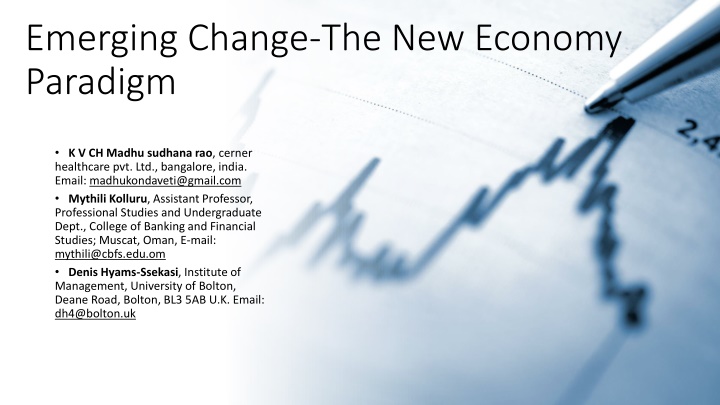

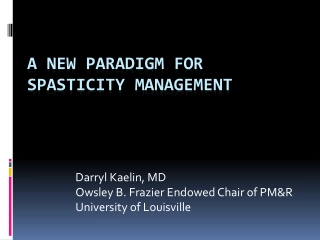
![[PDF⚡READ❤ONLINE] Black Hole Astrophysics: The Engine Paradigm (Springer Praxis](/thumb/21503/pdf-read-online-black-hole-astrophysics-the-engine-paradigm-springer-praxis.jpg)
![READ⚡[PDF]✔ Emerging Space Powers: The New Space Programs of Asia, the Middle Ea](/thumb/21554/read-pdf-emerging-space-powers-the-new-space-programs-of-asia-the-middle-ea.jpg)
